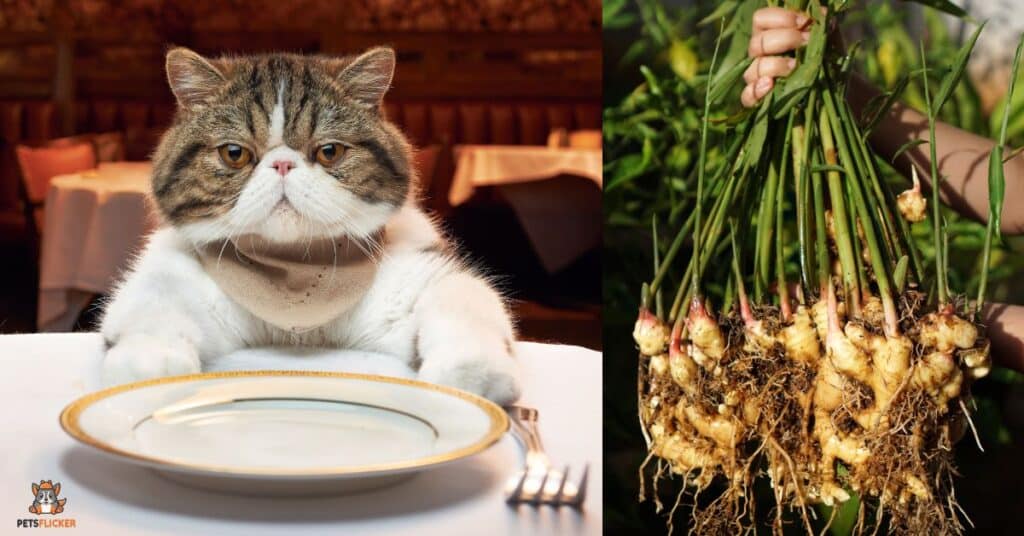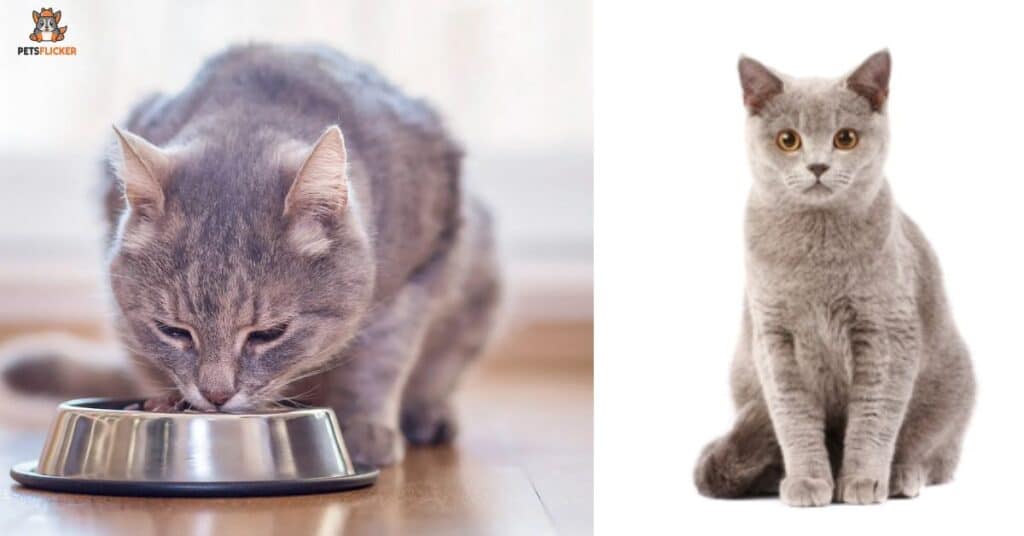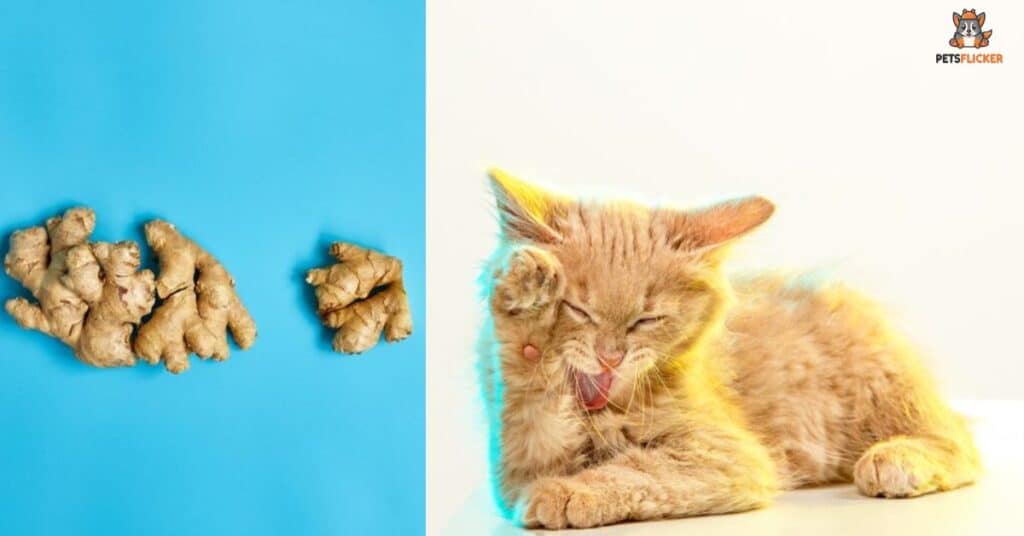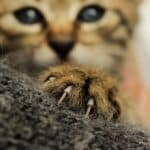Ginger, a spice used in cooking, can be safe for cats in small amounts like shaved ginger root, but it’s best to consult a vet before giving it to your feline friend. While it may help with mild digestive issues, avoid giving cats gingerbread or ginger beer due to their harmful ingredients like sugar.
Cats can eat ginger in moderation, especially in its natural form like shaved ginger root. It’s important to note that while ginger can have health benefits for cats such as aiding digestion and relieving upset stomachs, too much ginger can cause stomach irritation.
It’s crucial to consult with a veterinarian before introducing ginger or any new food to your cat’s diet to ensure their health and well-being. Avoid giving cats gingerbread or ginger beer, as they contain harmful ingredients like sugar that can be detrimental to feline health.
Health Benefits Of Ginger For Cats
Health Benefits of Ginger for Cats:
- Alleviates motion sickness, diarrhea, indigestion, inflammation, and memory loss in cats.
- Helps prevent nausea and vomiting, especially in cats undergoing cancer treatment or experiencing motion sickness.
- Reduces inflammation, benefiting cats with osteoarthritis, joint discomfort, and skin issues.
- Improves blood flow and cognitive function in older cats, potentially enhancing memory and mental performance.
It’s essential to use ginger with caution and in small doses, as some cats may experience digestive issues and diarrhea with excessive consumption. Cats with kidney, diabetes, or heart disease should avoid ginger, and consulting a veterinarian before introducing ginger to a cat’s diet is highly recommended to ensure their safety and well-being.
Can Cats Eat Ginger Roots?
Cats can eat ginger roots in moderation. Fresh and organic ginger roots can be safe for cats. It’s important to ensure the ginger is free from harmful additives like sugar or salt.

To give ginger to a cat, mince it and add it to their food or water. Alternatively, you can grate it and make a tea. Avoid giving whole ginger roots as they can be difficult for cats to chew.
Some cats may benefit from ginger roots to help with gastrointestinal issues. However, it’s crucial to consult with a veterinarian before introducing ginger roots to your cat’s diet. They can provide guidance based on your cat’s specific health needs.
Can You Give Your Cat Ginger Flower?
Ginger flowers can be safe for cats, depending on the specific type. For example, white ginger lily, also known as cinnamon jasmine, is generally safe for cats to consume in small amounts.
It’s crucial to research the exact species of ginger flower to ensure it’s non-toxic for cats. Some types of lilies, such as daylilies and true lilies are toxic to cats and should be avoided.
If you plan to give your cat ginger flowers, always check with your veterinarian first. They can provide guidance on safe options and help you avoid any potentially harmful varieties.
As with any new food or plant, it’s essential to monitor your cat for any adverse reactions after consuming ginger flowers. If you notice any unusual symptoms, contact your vet immediately for advice and assistance.
Read This Article: Meet The Tabby Bengal Cat – Exotic Elegance Of A Hybrid Cat
Can Cats Eat Gingerbread?
Cats should not eat gingerbread as it contains ingredients that can be harmful to them. Raw dough in gingerbread can expand in a cat’s stomach, leading to discomfort or even serious health issues. Artificial sweeteners like xylitol in gingerbread can cause low blood sugar, liver failure, and other complications in cats.

Spices commonly found in gingerbread, such as nutmeg and cinnamon, can irritate a cat’s mouth, stomach, and bowels, causing vomiting, diarrhea, and loss of appetite. It’s essential to keep gingerbread and similar treats away from cats to avoid potential health risks. Instead, stick to cat-safe treats designed specifically for their dietary needs and preferences.
Can Cats Eat Ginger Biscuits
Cats should not eat ginger biscuits due to several reasons:
- Ginger biscuits contain ingredients like sugar, dough, and sometimes artificial sweeteners like xylitol, which are harmful to cats’ health.
- Sugar and artificial sweeteners can lead to dental issues, obesity, diabetes, and liver failure in cats.
- The dough in ginger biscuits can expand in a cat’s stomach, causing discomfort, bloating, or even a life-threatening condition called gastric dilation-volvulus (GDV).
- Spices like ginger, nutmeg, and cinnamon present in ginger biscuits can irritate a cat’s mouth, stomach, and intestines, leading to vomiting, diarrhea, and digestive distress.
It’s crucial to keep ginger biscuits and similar treats away from cats and offer them only foods that are specifically formulated for feline dietary needs to ensure their well-being and avoid potential health complications.
Are Ginger Snaps Toxic To Cats?
Ginger snaps are not safe for cats to consume. They contain ingredients like sugar, xylitol, and spices that can be harmful to feline health. Xylitol, especially, can lead to low blood sugar, liver failure, and other serious issues in cats.
Spices like nutmeg and cinnamon found in ginger snaps can cause irritation to a cat’s mouth, stomach, and digestive system. Ingesting ginger snaps can result in vomiting, diarrhea, and discomfort for cats. It’s crucial to keep these treats away from cats to prevent potential health risks.
Instead of offering ginger snaps, provide your cat with safe and appropriate treats specifically designed for feline consumption. Consult with your veterinarian if you have any concerns about your cat’s diet or potential exposure to harmful foods.
Also Read This Article: Why Does My Cat Have A Small Head?
Are Pickled Ginger Safe For Cats?
Pickled ginger is not safe for cats to consume due to its ingredients like salt, sugar, and vinegar, which can be harmful to feline health. Vinegar in pickled ginger can lead to acidosis in cats, causing various health issues. Sugar in pickled ginger can contribute to dental problems, weight gain, and diabetes in cats.
Excess salt in pickled ginger can lead to electrolyte imbalances and potentially cause seizures in cats. It’s essential to keep pickled ginger and similar foods away from cats to prevent any adverse reactions or health complications. Stick to cat-safe treats and foods recommended by veterinarians for your feline friend’s well-being.
Can Cats Eat Ginger Ale?
Cats should not consume ginger ale as it can be harmful to their health due to toxic elements such as caffeine, sugar, and carbonation. These ingredients can lead to various health issues like tooth decay, obesity, diabetes, and liver failure in cats. It’s crucial to keep ginger ale and similar carbonated drinks away from cats to ensure their well-being.
- Ginger ale contains caffeine, which can cause agitation, rapid heartbeat, tremors, and convulsions in cats.
- Excessive sugar consumption from ginger ale can lead to dental problems, weight gain, and diabetes in cats.
- Carbonation in ginger ale can cause gas, bloating, and abdominal discomfort in cats, making it unsuitable for feline consumption.
Can Ginger Help Cats’ Upset Stomachs?
Ginger has the potential to help cats with upset stomachs by aiding in faster stomach emptying, which can ease constipation, heartburn, and other stomach issues. Additionally, ginger’s ability to soothe the stomach lining and increase mucus production can help cats feel better and alleviate stomach pain.
When given in moderation, ginger can be a natural remedy for cats’ upset stomachs, providing relief without the need for medication. However, it’s essential to consult with a veterinarian before giving ginger to your cat to ensure it’s safe and suitable for their specific health needs.
Do Cats Like the Smell Of Ginger?
Some cats may find the smell of ginger pleasant due to its pungent and aromatic nature. Cats have a keen sense of smell, and they may be attracted to scents that are strong or intriguing to them.
Not all cats may like the spicy and bitter smell of ginger, as they have different preferences when it comes to scents and tastes. It’s essential to observe your cat’s reaction to ginger and other scents to understand their preferences better.
Whether cats like the smell of ginger can vary from one cat to another, depending on their individual preferences and sensitivity to different odors.
Can Cats Eat Ginger Cookies
Cats should not eat ginger cookies due to several reasons:
- Ginger cookies contain ingredients like sugar, flour, and spices such as ginger, cinnamon, and nutmeg, which are not suitable for cats’ digestive systems.
- Sugar and flour can lead to dental issues, obesity, diabetes, and other health problems in cats if consumed regularly.
- Spices like ginger, cinnamon, and nutmeg can irritate a cat’s mouth, stomach, and intestines, causing gastrointestinal upset, vomiting, and diarrhea.
- The high calorie and carbohydrate content of ginger cookies is not suitable for cats, as they require a primarily protein-based diet for optimal health.
It’s important to avoid offering ginger cookies or any human desserts to cats and provide them with a balanced and species-appropriate diet to ensure their well-being and avoid potential health issues.
Frequently Asked Question
Can cats safely consume gingerbread?
No, gingerbread is not safe for cats due to its sugar content and other potentially harmful ingredients.
What form of ginger is safe for cats to consume?
Shaved ginger root or ginger tea made from boiled ginger root pieces is safe for cats in moderation.
Is ginger ale suitable for cats?
No, ginger ale is not suitable for cats as it contains sugar, caffeine, and carbonation, which can be harmful to their health.
Can cats consume ginger flowers?
Some types of ginger flowers, like white ginger lilies, are safe for cats, but others should be avoided as they can be toxic.
What are the potential risks of giving cats too much ginger?
Too much ginger can cause stomach irritation, digestive issues, and may not be suitable for cats with certain health conditions like kidney or heart disease.
How should ginger be introduced to a cat’s diet?
It’s best to consult a veterinarian before introducing ginger to a cat’s diet and start with small amounts to observe any adverse reactions or sensitivities.
Conclusion
Cats can eat ginger in moderation, but it’s crucial to be aware of the potential risks and benefits associated with it. Ginger can offer health benefits such as aiding digestion and relieving nausea, excessive consumption can lead to stomach irritation and digestive issues in cats.
It’s important for cat owners to consult with a veterinarian before introducing ginger into their cat’s diet to ensure it’s suitable for their individual health needs. Veterinarians can provide guidance on safe amounts and forms of ginger to give to cats, as well as advise on potential risks to watch out for.
Ginger can be a beneficial addition to a cat’s diet in small amounts, it’s essential to prioritize their health and well-being by being mindful of the risks and consulting with a professional before making dietary changes.

Elax is a seasoned writer with five years of experience specializing in articles focused on pets. His passion for animals and extensive knowledge shines through his engaging and informative writing style, captivating readers with insights into pet care and companionship. With a knack for crafting compelling content, Elax brings a wealth of expertise to the realm of pet-centric literature on your website.







